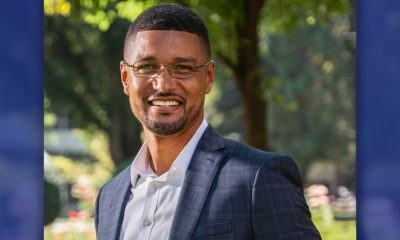Black History
Meet Kamilah Moore, Young Activist and Lawyer Chairing California’s Reparations Task Force
“(Reparation) stems from President Lincoln’s promise to give emancipated Black people 40 acres and a mule,” Kamilah V. Moore, who was elected the chair of the California reparations task force, told California Black Media. “But that failed with Johnson coming in after Lincoln’s assassination and taking all of that back, leaving my ancestors to fend for themselves in a country that facilitated their demise through discrimination,” she said.

By Edward Henderson | California Black Media
Alphonso “Tucky” Blunt, owner of a marijuana product store in Oakland called Blunts and Moore, says his business is located in the same zip code where he was arrested for selling weed illegally in 2004.
Now that he is legit in the business — he opened his store in a little over three years ago — Blunt says it is nearly impossible for Black and other minority-owned cannabis startups like his to make a profit in California.
“Where’s the tradeoff? I’ve been in the business for a few years and I’m still in the red. California has one of the highest tax rates on cannabis businesses anywhere. Oakland is in the top four of anywhere in the country,” said Blunt. “We also pay the most for armed guards. It costs like $25 to $30 per hour. The city requires us to have them — unlike Berkeley where they are not required. But police respond faster there.”
Blunt says the challenges California cannabis businesses face are many, including the fact that they have to pay federal taxes but can’t write off any expenses because cannabis is not legal on the federal level. Businesses like his also have challenges banking because of federal restrictions. Plus, criminals frequently target cannabis businesses and when they do, insurance companies are typically unwilling to pay for damage or lost products, Blunt says.
To address some of the challenges minority entrepreneurs in the industry are facing —particularly those who were victims of the War on Drugs — legislators in California have taken a number of steps to lower barriers to entry in the industry.
“There is no doubt that the War on Drugs has disproportionately harmed people of color and their communities,” said Sen. Steve Bradford (D-Gardena), who is also chair of the California Legislative Black Caucus.
In 2019, Bradford authored SB 595, which established a cannabis equity fee waiver program. The Legislature passed that bill and the governor signed it into law the same year. The program was contingent on funding Bradford successfully obtained for its implementation in the Budget Act of 2021.
Right now, California is in the process of approving a $30 million fund that will eliminate business fees for some entrepreneurs entering the cannabis business in the state.
Last week, the Department of Cannabis Control (DCC) released the regulations it will follow to implement Senate Bill (SB) 166, the budget trailer bill Gov. Gavin Newsom signed into law in September establishing the fee waiver program.
The program creates pathways for individuals affected by the War on Drugs to enter into the cannabis industry. Potential business owners who are living at or below 60% of the Area Median Income; who were previously convicted or arrested for a cannabis-related offense; or who live in a community negatively impacted by past cannabis policies would be eligible for the program.
The waivers go toward licensing fees for their potential businesses, which can range from $1,205 to $77,905. The DCC will start accepting fee waiver requests beginning Jan. 1, 2022.
The California Office of Administrative Law will publish the proposed regulations as being “under review” on its website: https://oal.ca.gov/. DCC will share instructions for submitting a public comment and participating in the regulatory process. The agency will also announce when the comment period, which will last five days, is open to the public.
“SB 166 is part of my continued mission for the Government to atone for the wrongs inflicted on people by supporting them with opportunities to enter and thrive in the cannabis market. I encourage anyone interested in the cannabis industry, especially equity cannabis applicants and operators, to provide comments during the short window for feedback.”
DCC Director Nicole Elliott says the state will continue to invest in opportunities to make the licensing businesses more equitable, particularly for people who were impacted by the War on Drugs.
“We know access to capital remains a persistent challenge for California’s equity applicants and licensees,” she said. “These waivers aim to address this challenge for those who need the most financial support.”
Bradford said for government to truly understand the challenges entrepreneurs are facing, they have to make their voices heard and talk about the barriers to entry they face.
“These regulations are extremely important for determining who will and will not get application, licensing, and renewal fee waivers, and the amount of help they will receive,” said Bradford. “It is vital that the Administration have an accurate understanding of people’s experiences in order to create a framework that respects them.”
Blunt says he welcomes the $30 million investment the state is making to help with licenses and other costs, but entrepreneurs like he need more.
“We need a two-year tax break. We have to pay some sales taxes but the extra cannabis taxes we pay, we need the break to recover. We can save some of that money and reinvest in our businesses and have some money for security,” says Blunt. “My business makes around $5 million a year, but the money I spend on security and taxes alone is easily in the $2-3 million range — and I’m not counting other expenses like payroll and other operational expenses. How will we ever make a profit?”
Activism
Oakland Post: Week of December 25 – 31, 2024
The printed Weekly Edition of the Oakland Post: Week of December 25 – 31, 2024

To enlarge your view of this issue, use the slider, magnifying glass icon or full page icon in the lower right corner of the browser window. ![]()
Activism
Living His Legacy: The Late Oscar Wright’s “Village” Vows to Inherit Activist’s Commitment to Education
Kingmakers of Oakland (KOO), a nonprofit organization that works to improve educational and life outcomes for Black boys and men, stated that “Oscar Wright is one of the most prolific, consistent, and committed advocates of equity for Black students and Black Families here in Oakland for the past six decades.”

By Antonio Ray Harvey, California Black Media
Activists mourning Oscar Carl Wright’s death, have pledged to continue his lifelong mission of advocating for Black students and families in Northern California.
Wright, 101, who passed away on Nov. 18, was involved in Oakland’s educational affairs until his death.
Now, friends and admirers acknowledge that carrying on his legacy means doubling down on the unfinished work that Wright dedicated his life, time, and resources to, according to Y’Anad Burrell, a family friend and founder of San Francisco-based Glass House Communications (GHC).
“Mr. Wright did a lot of work around equity, specifically, for Black students based on their needs — whether it was tutoring, passing classes, or graduating,” Burrell said.
Wright became a champion for his children’s education, recognizing the disparities between their school experiences and his own upbringing in the Mississippi Delta.
Burrell told California Black Media (CBM) that the crisis of unequal access to resources and a quality education continues to affect the Oakland Unified School District (OUSD).
According to Oakland Reach, in the city of Oakland, only 3 in 10 Black and Brown students are reading at or above grade level. In addition, only 1 in 10 are doing math at or above grade level.
Oakland REACH is a parent-run, parent-led organization. It aims to empowers families from the most underserved communities to demand high-quality schools for their children.
Wright’s work as an activist had impact across the state but he was primarily known in the Bay Area. Alongside the Black United Front for Educational Reform (BUFER), he filed a complaint against OUSD for violating the Civil Rights Act of 1964.
In 2000, the OUSD school board proposed an action plan to address educational inequity, but it was never implemented.
Wright later founded the African American Honor Roll Celebration at Acts Full Gospel Church, an award that recognizes Black students with a grade point average of 3.0 or better. Each year, more than 1,000 students are honored at this ceremony.
Kingmakers of Oakland (KOO), a nonprofit organization that works to improve educational and life outcomes for Black boys and men, stated that “Oscar Wright is one of the most prolific, consistent, and committed advocates of equity for Black students and Black Families here in Oakland for the past six decades.”
Burrell said that one of the main reasons Wright’s work was so essential for families and children in Oakland that is the direct relationship between acquiring a quality education and affording quality housing, maintaining food security, achieving mental wellness, and securing stable employment.
Wright was the child of sharecroppers from Coahoma County, Mississippi. He attended Alcorn State University, a Historically Black College and University (HBCU).
In the late 1950s, Wright and his family relocated to the Bay Area where he worked as a contractor and civil engineer. He later became an active member of the National Association for the Advancement of Colored People (NAACP).
Burrell said the people who will carry on Wright’s work are part of a “village” that includes KOO’s CEO Chris Chatmon. Wright was a mentor to Chatmon.
“It will not be one entity, one person, or one organization that picks up the baton because it was a village effort that worked alongside Mr. Wright for all these years,” Burrell said.
Burell says that legacy will live on.
Activism
Celebrating East Bay Leaders Keith Carson and Federal Glover at Geoffrey’s Inner Circle
Several leaders were in attendance including fellow Alameda Supervisors Elisa Marquez and Lena Tam, Superior Court judge-elect Terry Wiley, and African American Sports and Entertainment Group’s founder Ray Bobbitt, along with many other guests.

By Magaly Muñoz
After decades of public service in the East Bay, community members and leaders came together to celebrate Alameda County Supervisor Keith Carson and Contra Costa Supervisor Federal Glover at Geoffrey’s Inner Circle Thursday afternoon.
Several leaders were in attendance including fellow Alameda Supervisors Elisa Marquez and Lena Tam, Superior Court judge-elect Terry Wiley, and African American Sports and Entertainment Group’s founder Ray Bobbitt, along with many other guests.
First elected in 1992, Carson has served District 5 for 24 years and announced his decision to step away from his seat earlier this year, just before the deadline to submit new candidate applications.
He dedicated his long career to bringing access to health care, addressing homelessness, lowering crime, improving business retention, and growing job opportunities in Alameda County.
Glover began his tenure as Contra Costa Supervisor in 2000 and previously served as mayor of Pittsburg in 1998. During his time as Supervisor, he supported initiatives on public transportation, created committees for public safety, and supported task forces on health.
“These two distinguished leaders have dedicated their lives to improving the lives of so many people across Alameda and Contra Costa (counties). Their work has touched every corner of the East Bay,” Alameda County Supervisor and President Nate Miley said.
Leaders from both counties spoke on the supervisors’ legacies and their dedicated years of service.
Contra Costa Supervisor John Gioia said that Glover was the type of person that grew with each challenge that crossed him, especially after he had major surgery in 2020. But Gioia said that the treatment did not deter Glover.
“He’s had tougher races for reelection than any member of our board that I can recall, and he’s always come back stronger than before,” Gioia said.
Sharing a county border, Gioia complimented Carson on his ability to sway leaders from both sides of the political aisle to listen on the issues affecting locals and residents across the nation.
Shannell Scales Preston, who is taking over Glover’s D5 seat in 2025, told event attendees that Glover was a mentor to her for many years. He often would call Preston after Pittsburg City Council meetings with remarks about her performance and how well she spoke up on certain issues.
With Glover spending years as the only Black elected official in local government, Preston would ask him how he managed to not feel lonely about the job. She then congratulated him on being the only supervisor in Contra Costa to have all Black mayors under his district in 2023.
Preston said he’s been a leader to many diverse groups and his tenure has seen leaders of all backgrounds, but particularly paving the way for Black leaders in predominantly white areas.
Miley, who has shared his entire 24-year tenure on the Alameda Board with Carson, tearfully wished the exiting supervisor luck and said he would miss him dearly.
Carson said that as we embark on a “dark time” for everyone across the nation and worldwide in 2025, it’s important to continue communicating and working with groups from all backgrounds because that is the only way things will get done.
“There have been many lonely nights, but then the sun comes out in the morning when you continue to think, ‘I can make a difference,’” Carson said.
-

 Activism4 weeks ago
Activism4 weeks agoOakland Post: Week of November 27 – December 3, 2024
-

 Activism2 weeks ago
Activism2 weeks agoButler, Lee Celebrate Passage of Bill to Honor Congresswoman Shirley Chisholm with Congressional Gold Medal
-

 Activism2 weeks ago
Activism2 weeks agoPost News Group to Host Second Town Hall on Racism, Hate Crimes
-

 Activism2 weeks ago
Activism2 weeks agoDelta Sigma Theta Alumnae Chapters Host World AIDS Day Event
-

 Business2 weeks ago
Business2 weeks agoLandlords Are Using AI to Raise Rents — And California Cities Are Leading the Pushback
-

 Activism3 weeks ago
Activism3 weeks agoOakland Post: Week of December 4 – 10, 2024
-

 #NNPA BlackPress4 weeks ago
#NNPA BlackPress4 weeks agoNational Action Network Announces 2025 Inauguration Day Rally
-

 Arts and Culture1 week ago
Arts and Culture1 week agoPromise Marks Performs Songs of Etta James in One-Woman Show, “A Sunday Kind of Love” at the Black Repertory Theater in Berkeley























































